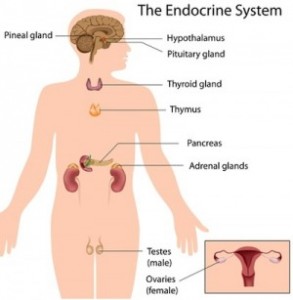Guest Writer for Wake Up World
Although you may never pick up an alcoholic beverage, you could still be regularly exposing yourself to the detrimental health effects of alcohol. Household products, for example, often contain ethyl alcohol (ethanol) and can be a source many people don’t consider. While exposure to these products won’t necessarily make you intoxicated, mere exposure to alcohol can be a health concern. Alcohol is an endocrine disruptor and many people are becoming increasingly concerned with its pervasiveness in common, everyday products.
What is an Endocrine Disruptor?
Your endocrine system produces and regulates various hormones within your body. It consists of the thyroid, pineal gland, pituitary gland, ovaries or testes, hypothalamus, pancreas, gastrointestinal tract, and adrenal glands. Simply put, an endocrine disruptor is any compound or substance that affects the normal operation of the endocrine system. When the endocrine system is disrupted, imbalances can occur and produce infertility, depression, and immune system suppression, among other health issues.
[pro_ad_display_adzone id=”110028″]
There are many prevalent endocrine disruptors in the environment, including pesticides, bisphenol-A (BPA), phthalates, and fungicides.[1] These substances have received quite a bit of attention and research has repeatedly demonstrated the disruptive effects they have on hormone function. One substance that’s extremely prevalent, but gets less attention, is alcohol.
How Does Alcohol Disrupt Endocrine Function?
For years, alcohol (ethanol) has been known to negatively impact hormone function.[2] Alcohol has the power to hinder glands associated with the secretion and regulation of hormones, like the pituitary gland, possibly leading to complications with the body’s ability to maintain hormonal equilibrium. The pituitary gland, for example, synthesizes and secretes essential healing and repair hormones, such as human growth hormone (HGH). This gland has been shown to experience noticeable impairment from alcohol exposure.[3]
Insulin, an important hormone that regulates blood sugar, can be severely impacted from prolonged alcohol consumption. Following a bout of heavy drinking, blood sugar often spikes, dramatically. Insulin comes to the rescue by transporting this sugar (blood glucose) into the cells to be used as energy. When blood sugar spikes in a robust, dramatic motion, insulin will quickly bring it down in a similar fashion, typically resulting in low blood sugar. This can be particularly dangerous for type II diabetics, many of whom are already at odds with maintaining normal blood sugar levels.
Alcohol also has the potential of impeding the body’s ability to regulate and absorb calcium, creating a strong risk factor for the development of osteoporosis. Long-term health problems such as liver damage, sexual dysfunction, and ulcers typically result from chronic or acute consumption.[4] And, to the surprise of many, even topical application of ethanol has been scrutinized as a possible means for consumption.
Don’t Drink? Doesn’t Matter
Many people don’t know that when applied topically, alcohol can enter your bloodstream. When is alcohol applied topically? The use of hand sanitizer is rampant and it’s one of the most readily-available products that contain alcohol. Everyone has a bottle of rubbing alcohol in the medicine cabinet. Other common items include body lotions, cosmetic oils (even baby oils), aftershave, air fresheners, eye makeup, shampoos, insect repellants, hair dyes, dishwasher and laundry detergents, paint, perfumes, deodorants, and cooking oils.
Research has shown that using hand sanitizer increases blood concentration of ethanol at low (yet measurable) levels.[5] One study that focused on hospital employees found that over 30% exhaled low levels of ethanol just one minute after using hand sanitizer.[6] In one case, a one-month old baby suffering from lethargy was found to be intoxicated from an alcohol-soaked gauze used to treat the umbilical cord.[7]
A Final Thought
Caution should always apply with alcohol, as there really is no debate about the negative health implications and its disrupting effect on the endocrine system. The best way to minimize exposure is to avoid alcoholic beverages and check the ingredient lists of other products for alcohol, ethanol, ethyl alcohol, ethyl hydrate, ethyl hydroxide, and methylcarbinol. There are plenty of other non-alcoholic options available.
-Dr. Edward F. Group III, DC, ND, DACBN, DCBCN, DABFM
Article References:
- Klingmà¼ller D1, Alléra A. [Endocrine disruptors: hormone-active chemicals from the environment: a risk to humans?]. Dtsch Med Wochenschr. 2011 May;136(18):967-72. doi: 10.1055/s-0031-1275832. Epub 2011 Apr 27.
- Rajesh K. Naz. Endocrine Disruptors: Effects on Male and Female Reproductive Systems. CRC Press, Jan 21, 1999. Pg 291.
- Yatan Pal Singh Balhara, M.D., and Koushik Sinha Deb, M.D. Impact of alcohol use on thyroid function. Indian Journal of Endocrinology Metabolism. 2013 July;17(4):580-7. doi: 10.4103/2230-8210.113724.
- NICHOLAS EMANUELE, M.D., AND MARYANN EMANUELE, M.D. The Endocrine System: Alcohol Alters Critical Hormonal Balance. ALCOHOL HEALTH & RESEARCH WORLD. VOL . 21, NO. 1, 1997.
- Dirk W Lachenmeier. Safety evaluation of topical applications of ethanol on the skin and inside the oral cavity. J Occup Med Toxicol. 2008; 3: 26. 2008. doi: 10.1186/1745-6673-3-26.
- Ahmed-Lecheheb D1, Cunat L, Hartemann P, Hautemanià¨re A. Dermal and pulmonary absorption of ethanol from alcohol-based hand rub. J Hosp Infect. 2012 May;81(1):31-5. doi: 10.1016/j.jhin.2012.02.006. Epub 2012 Mar 22.
- Dalt LD1, Dall’Amico R, Laverda AM, Chemollo C, Chiandetti L. Percutaneous ethyl alcohol intoxication in a one-month-old infant. Pediatr Emerg Care. 1991 Dec;7(6):343-4.
Previous articles by Dr. Group:
- Ten Shocking Facts about Mercury Amalgam
- The 9 Best Herbs for Lung Cleansing and Respiratory Support
- The Benefits of Himalayan Salt
- How to Flush the Liver
- Lung Cleansing With Peppermint Oil
- The Benefits of Organic Hemp Milk + How to Make Your Own
- What is Azodicarbonamide? 9 Facts About This Dangerous Food Additive
- 8 Must-Know Facts About Fukushima Nuclear Radiation
- Nine Shocking Dangers of Fluoride Exposure
- 10 Natural Remedies for Kidney Stones
- Seven Facts You May Not Know About Coconut Oil
About the author:
 Dr. Edward F. Group founded Global Healing Center in 1998 and is currently the Chief Executive Officer. Heading up the research and development team, Dr. Group assumes a hands-on approach in producing new and advanced degenerative disease products and information.
Dr. Edward F. Group founded Global Healing Center in 1998 and is currently the Chief Executive Officer. Heading up the research and development team, Dr. Group assumes a hands-on approach in producing new and advanced degenerative disease products and information.
Dr. Group has studied natural healing methods for over 20 years and now teaches individuals and practitioners all around the world. He no longer sees patients but solely concentrates on spreading the word of health and wellness to the global community. Under his leadership, Global Healing Center, Inc. has earned recognition as one of the largest alternative, natural and organic health resources on the internet.
[pro_ad_display_adzone id=”110027″]







